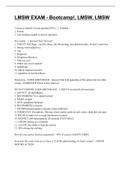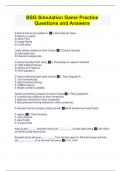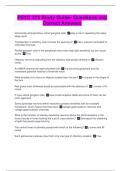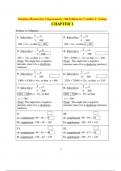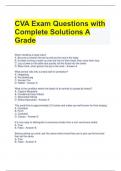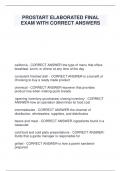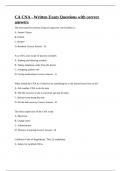3 Areas to identify in each question (PPL) - 1. Problem
2. Person
3. Last Sentence (guide to answer question)
Key words - 1. Person/Client "hot seat"
2. SAFETY Red Flags - suicide, abuse, life-threatening, unexplained marks, alcohol, recent loss
3. Strong words/adjectives
4. Age
5. Diagnosis
6. Symptoms/Duration
7. Who are you?
8. Where are you in session?
9. Quotations
10. Direct requests/concerns
11. Qualifiers (First/Next/Best)
Distractors - FARM GRITS ROAD - Answers that look appealing at first glance but are often
wrong - ELIMINATE! Exam is here and now
DO NOT CHOOSE FARM GRITS ROAD - 1. FOCUS on unresolved issues/past
2. ADVICE - giving/judging
3. RECOMMEND "to a support group"
4. MAKE an appt.
5. GIVE pamphlets/literature
6. RECOMMEND a session
7. INFORM parents/speak to parents (when child/ado)
8. TERMINATE (Exceptions: Moving, client reaches goals/no new crisis, client does not pay)
9. SPEAK to supervisor (except transference/counter)
10. RESPECT self-determination (If mentally UNSTABLE)
11. OFFER contract as a reminder
12. ALLOW the clients to lead the session
13. DO nothing/say nothing
How do you answer first/next questions? - 90% of exam is SAFETY FIRST.
How does the exam want you to have a CLEAR understanding of client's issues? - ASSESS
BEFORE ACTION.
,RUSAFE - 1. RULE out medical
2. UNDER the influence/delusional/hallucinating Do Not Treat
3. SAVE Lives - Safety first (Answers: Duty to warn, report child/elder abuse, 911, mobile
crisis, ER)
4. ASSESS before action - (Answers: ASSESS, ASK or DICE - Determine, Identify,Clarify,
Explore)
5. FEELINGS - (Answers: ACKNOWLEDGE person's feelings) CONCERNS (AID ASSIST,
INFORM client, DISCUSS concerns)
6. EMPOWER - If client is mentally stable/alert (Answers: Respect client's decisions)
COE: Ethical responsibilities towards clients - 1. Client's best interests are primary
2. Respect/promote right to self-determination if client is mentally alert/stable, NOT
unstable/intoxicated/psychotic
3. Informed consent, written agreement by client to undergo treatment, risks/benefits/costs
disclosed
4. Avoid conflicts of interest (Things that interfere with SW's impartial judgment/discretion)
5. DO NOT promote individual therapy sessions to ppl who have a relationship w/ each other
(except couples, family, group treatment) - Provide family members with appropriate referrals
6. Avoid dual/multiple relationships
7. Avoid bartering (unless common practice in community)
8. Obtain a professional translator FIRST if client does not speak the language of SW
9. Do not disclose client information w/out consent unless req'd by law
10. Provide client with reasonable access to records (First explore/discuss reason for request)
Follow laws of state.
11. Ensure CONTINUITY of services
12. NO relations with clients past or present
Mandated reporting - SW's are req'd and responsible for reporting any instances of abuse that is
suspected. Abuse includes physical, emotional, sexual, neglect, CHILD AND ELDER ABUSE
Duty to Warn - SW's MUST WARN a threatened victim of any harm that his/her client may
cause when there is a REAL INTENT (PLAN)
HIV Decisions - NOT DUTY TO WARN! 3 options:
1. FIRST urge client to disclose to partner
2. FIRST encourage client to engage in safe sex
3. Research/follow state laws as needed
Subpoena by the court - SW may be req'd by law to disclose confidential information
,COE: Ethical responsibilities to colleagues - 1. Refer to colleague who may be better trained in
an area than SW. SW can take client but must be COMPETENT.
2. When CONSULTING with colleague, disclose least amount of information
3. FIRST speak to a colleague to discourage/prevent/correct unethical behavior
4. AVOID relationships with colleagues (conflict of interest)
COE: Ethical responsibilities in practice settings - 1. Accurately document services in client's
records while keeping best interests in mind
2. Maintain records securely for a period of time consistent with state laws
COE: Ethical responsibilities as professionals - 1. MONITOR/EVALUATE policies and
implementation of programs
2. ADVOCATE when necessary
HMO Insurance/Short term Care/MANAGED CARE - 1. Emphasizes short term, discourages
long term treatment
2. Cases assigned to case manager to whom provider must justify necessity for treatment for
payment and services.
3. More precise diagnosis = greater likelihood of reimbursement
4. Encourages Cognitive/Behavioral short term TX.
5. Contracts are INFLEXIBLE, abide by rules to receive reimbursement
Disorders in Infancy, Childhood, Adolescence - Autism, ADHD, Oppositional Defiant Disorder,
Conduct Disorder, Enuresis, Separation Anxiety Disorder
Adult Disorders - Delirium, Dementia, Amnestic/Cognitive Disorders, Schizophrenia and other
Psychotic Disorders, Mood Disorders, Anxiety Disorders, Somatoform Disorders, Factitious
Disorders
attention-deficit/hyperactivity disorder (ADHD) - 1. Symptoms at least 6 months
2. Inattentive: Difficulty focusing, staying on task follow-through, listening, easily distracted,
loses things, forgetful
3. Hyperactive: Impulsive, fidgeting, running around, talking excessively
4. Several symptoms present prior to age 12
5. Must occur in 2 or more settings
6.. Behaviors can increase/decrease based on settings.
7. TX: Behavior modification
Oppositional Defiant Disorder - At least 6 months - Angry, irritiable, defiant, talking back to
adults, rebellious behavior, attitude, blames others, cursing, lying
- NO SERIOUS VIOLATIONS OF OTHERS RIGHTS
, a childhood disorder in which children are repeatedly argumentative and defiant, angry and
irritable, and in some cases, vindictive. Lasting at least 6 months
Conduct Disorder - 1. Violates other's rights, bullies, shoplifts, truancy, DX up to age 17
2. TX: Family, schools, community, client, parent/child behavior modificationq skills
a disorder that involves severe antisocial and aggressive behaviors that inflict pain on others or
involve destruction of property or denial of the rights of others. Has a childhood onset however it
is more likely to continue into adulthood. Adolescent onset less likely to display aggressive
behaviors. Symptoms occurred in the last year with at least one occurring in the last six months
Enuresis - 1. Repeatedly urinating during day/night
2. Up to 5 years old
3. Rule out medical first
involuntary discharge of urine, usually referring to a lack of bladder control
Repeated bed wetting, wetting clothes, wetting at least twice a week for approximately three
months, must be five years or older
Separation Anxiety Disorder - 1. Excessive distress when separated from major attachment
figures.
2. Clinging, school refusal, sleep refusal
3. School Phobia is a form of separation anxiety.
4. Brought on when leaving home/family members to attend school.
5. At least 1 month of symptoms
Impulse control disorders - Trichotillomania, Intermittent Explosive Disorder, Gambling,
Kleptomania, Pyromania,
Dementia - 1. Slow onset
2. Deterioration of memory/cognition
3. Alzheimer's, HIV, Parkinson's
Amnestic Disorders - Memory impairment w/out cognitive impairment
Korsakoff's Syndrome - Chronic alcoholism causes inability to recall previously learned
information

